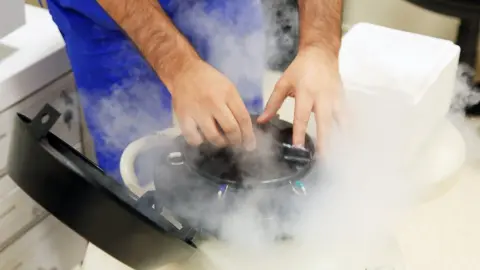Frozen-egg storage 10-year limit 'could be extended'
 Getty Images
Getty ImagesThe period of time for which eggs, sperm and embryos can be frozen could be extended, as the government calls for views on the current 10-year limit.
It said women's choices on when to have children were being restricted, despite advances in freezing technology.
Only the eggs of people whose fertility may be affected by disease can be kept for longer - up to 55 years.
The regulator said the time was right to consider a "more appropriate" storage limit.
So the government has now launched a consultation on the current law.
It will also consider the safety and quality of eggs, embryos and sperm stored for more than 10 years and any additional demand for storage facilities that could result.
'Heart-breaking decision'
"Although this could affect any one of us, I am particularly concerned by the impact of the current law on women's reproductive choices," said Caroline Dinenage, a minister in the Department of Health.
"A time limit can often mean women are faced with the heart-breaking decision to destroy their frozen eggs or feel pressured to have a child before they are ready."
A fertility charity has previously said women were being pushed to delay egg freezing later and later, because of the 10-year storage limit.
The number of women choosing to freeze their eggs has more than tripled in recent years, from 410 freezing cycles in 2012 to 1,462 in 2017.
Most - four out of five - are doing it for social reasons, to increase their chances of having a baby later in life, data suggests.
A much smaller number are freezing eggs before having unrelated medical treatment, such as to combat cancer.
The best time for a woman to freeze her eggs is before the age of 35, when the quality and number of eggs starts to decline - but the most common age for doing it is now 38.
Sally Cheshire, who chairs the Human Fertilisation and Embryology Authority, said the regulator had heard the voices of patient and doctors.
"While any change to the 10-year storage limit would be a matter for Parliament, as it requires a change in law, we believe the time is right to consider what a more appropriate storage limit could be that recognises both changes in science and in the way women are considering their fertility," she said.